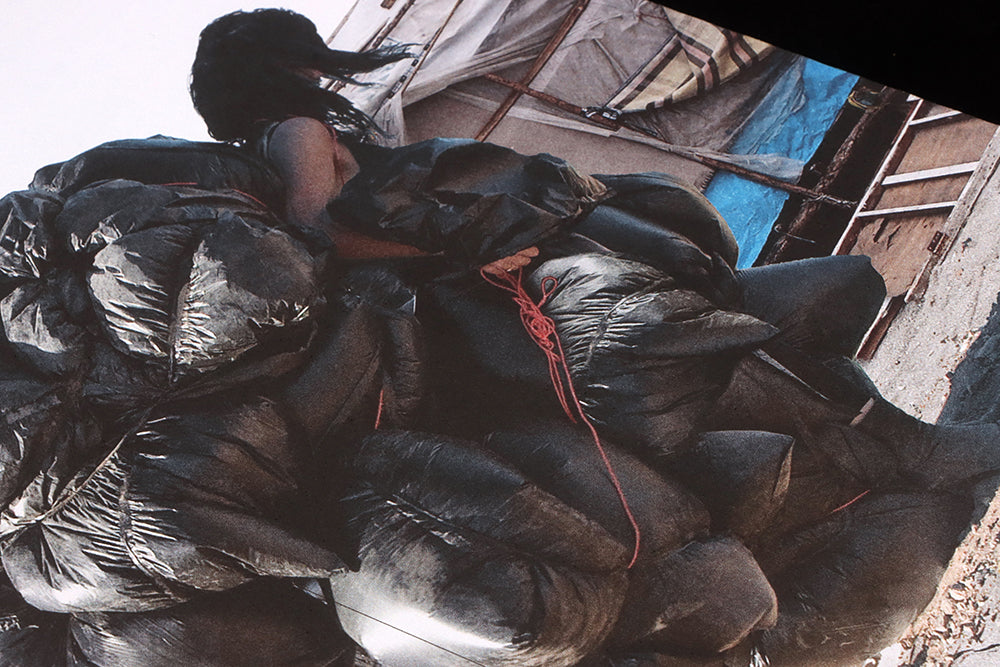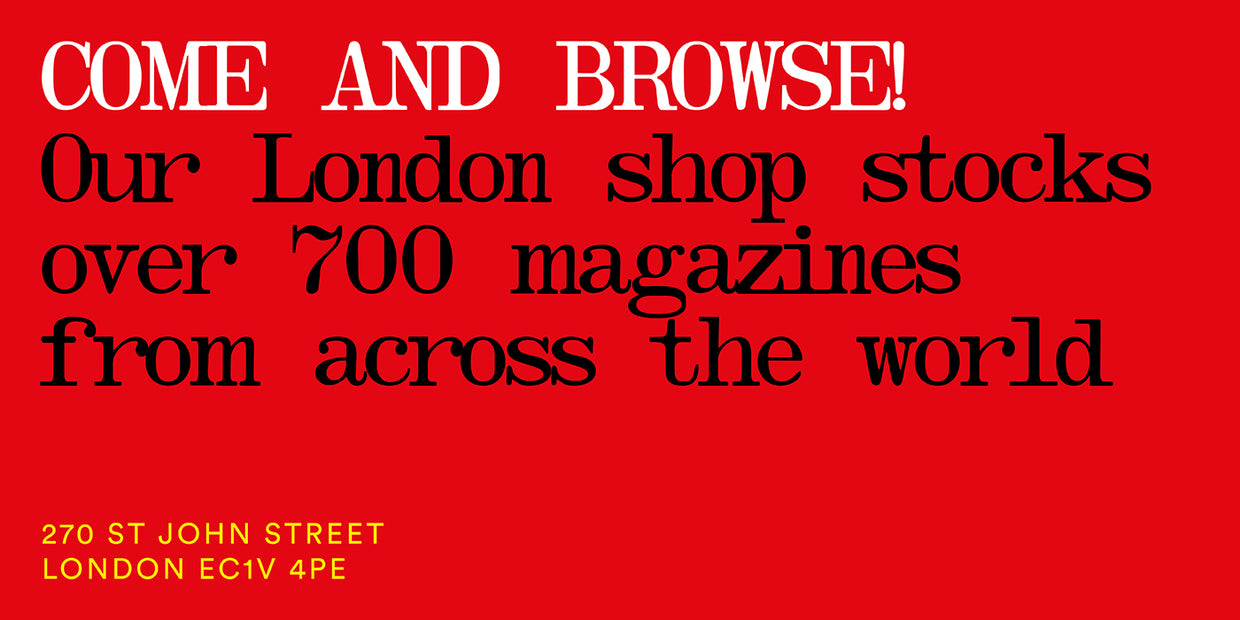
Icarus Complex #4
On the ashen cover of the subject of this month’s It's thing one thing, a single person struggles through a dust-covered street, bin bag upon bin bag piled upon their back.
The image, titled ‘The Furies (Titian, again) 2012’, is by interdisciplinary artist Mary Mattingly who’s core work explores themes of ‘home, travel, cartography, and humans relationships with each other, the environment, with machines, and with corporate and political entities.’ It’s at once a powerful, complex and troubling image—and a fair indication of the (necessarily) earnest climate-based content to follow.

‘Icarus is a story from Greek mythology,’ the Luxembourg-based Icarus Complex begins. ‘Icarus was held captive in a tower with his father Daedalus. In order to escape, Daedalus created two sets of wings made of feathers and wax for himself and his son. He taught Icarus how to fly and cautioned him not to soar too high or too low. The closeness to the sun would melt the wax, while flying too low would cause the feathers to get wet with sea water.’
The ‘Climate Change Magazine’ continues its exploration of the term as its used in psychoanalysis, concisely, ‘to describe an over-ambitious character with delusions of grandeur whose spiritual ambition exceeds its personality limits.’ Given the publication’s immediately overt remit, their point is easily made.

This isn’t the first time we’ve covered the twice-yearly Icarus on the Journal (read our 2019 review of issue one). It’s been three years since this title arrived at the magCulture shop for the first time. In that same moment, Extinction Rebellion were making international headlines as they staged a fortnight-long series of protests across central London. Back then, it seemed that the powers-that-be were finally waking up to the immediacy of our collective situation …and then came Covid.
This is precisely the point where Icarus editor-in-chief Afsaneh Angelina Rafii picks up the thread in their current editor’s letter: ‘Priorities shifted. What could have been the golden opportunity to bring about global systemic change was side-lined with the usual short-termism that has brought about the problems plaguing this world in the first place.’
Since 2019, the Intergovernmental Panel on Climate Change (IPCC) has reduced its window of opportunity to side-step ‘the worst of the climate change’ from 12 years to just three which, frankly, should be reason enough to jolt each and every one of us into immediate action but of course, climate change (and humans) are more complex than that—and complexity isn’t something us humans are always ‘good at’. We’re storytellers. The simpler, the better. But the climate crisis isn’t simple. And that’s where ‘an in-depth look at [its] issues and solutions’ is evermore crucial.
Still, we cannot afford to ‘lose hope or heart’, Rafii continues—and that’s what this now fourth issue conveys, very much sans eco-fluff. Whether aware of it or not, we’re all standing on a precipice, but there are people out there who are making things happen. The features throughout this issue take this as their raison d’etre; further embodied in a brand new section of the magazine named ‘Reflections’ which asks ‘artists from various disciplines to help reflect on the climate crisis through their chosen medium.’

For new section Reflections, dancers from the Basel Ballet invite the reader on a visual, photographic journey through four different climate-themed scenarios (above). It’s a compelling idea, though it’s difficult to translate the raw emotion and (no-doubt) real power of dance onto the static pages of a small-format magazine. However, where Reflections begins the conversation between art and climate crisis, a later feature ’Soup’ featuring photographer Mandy Barker is more immediately effective.

In Soup, we explore Barker’s uncomfortably-beautiful work over a total of 16 pages (above). Her photography explores the impact of plastic pollution in our oceans and, by working alongside scientists, the award-winning photographer aims to ‘raise awareness’ and, most importantly, invoke ‘the viewer to take action.’ The images are incredibly compelling (and, from a distance, even resemble the recent images taken by the James Webb Space Telescope. Discuss).
The core of this perfect-bound publication, however, is made up of in-depth, internationally-focused editorial. There’s ‘Voices’ which includes conversations with ‘low-carbon’ architect Tommaso Franzolini and ‘water rights’ activist Maude Barlow, and ‘Focus’ which takes a considered look at stories of ‘innovation, waste, agriculture and business’.
Here, our good friend the mushroom makes another appearance in ‘This is not a mushroom’, a piece exploring mycelium (fungal threads or ‘roots’) as an environmentally-friendly alternative to plastic. This is followed by ‘The next carbon sink’ which explores waste, ‘Managing resources in times of water scarcity’ and the photo-series that follows it (timely, given the extreme weather we’re having in the UK this summer) and finally, ‘Why greenwash is the critical new frontier in tackling climate change.’
Worth mentioning also is an initial section named ‘Ideas’ which sits at the front of the magazine and offers practical ‘ideas for change’ to us readers, listing ways to support legitimate new organisations, apps and initiatives and thus have an active part in the solutions explored.

Now, Icarus Complex certainly isn’t the only climate-themed magazine we stock—It’s Freezing in LA! And Emergence Magazine are two titles equally worth mentioning—but Icarus stands out for its depth of focus. It’s niche in the sense that it aims to drill into the complexity of the climate crisis and offer practical solutions; both for individuals and by raising the profile of those academics, scientists, philosophers, artists and architects doing very real, very practical work to both challenge and offer alternatives to the destructive ways in which we currently interact with the Earth.
Though it seems clear that we’re at a point where we now can’t ‘stop’ climate change—or even breakdown, to repeat Rafii’s words again, ‘we cannot afford to lose hope or heart’ in attempting to avoid total climate catastrophe. It’s for this reason that publications like Icarus Complex are worthy of repeat coverage; IFLA! and Emergence too. This is a clarion call that we can’t afford to sound just once.

As the feature ‘Why greenwash is the critical new frontier in tackling climate change’ begins: ‘It’s never been more important for us to be clear-eyed about the environmental threats we face’. And a depth and breadth of understanding of the issues that we face is one way that can help us to make informed decisions about how we move through the world; from our hyper-local communities to the planet as a whole.
Let us, after all, not forget Icarus who ‘soon forgot his father’s warnings, and started flying higher and higher, until the wax started melting under the scorching sun. His wings dissolved and he fell into the sea and drowned.’
The wax on our wings has already begun to melt, but by working together, we can pull ourselves that little bit further away from the scorching sun.
Editor-in-chief Afsaneh Angelina Rafii
Art director Sérgio Alves
See more magazines about the climate crisis


